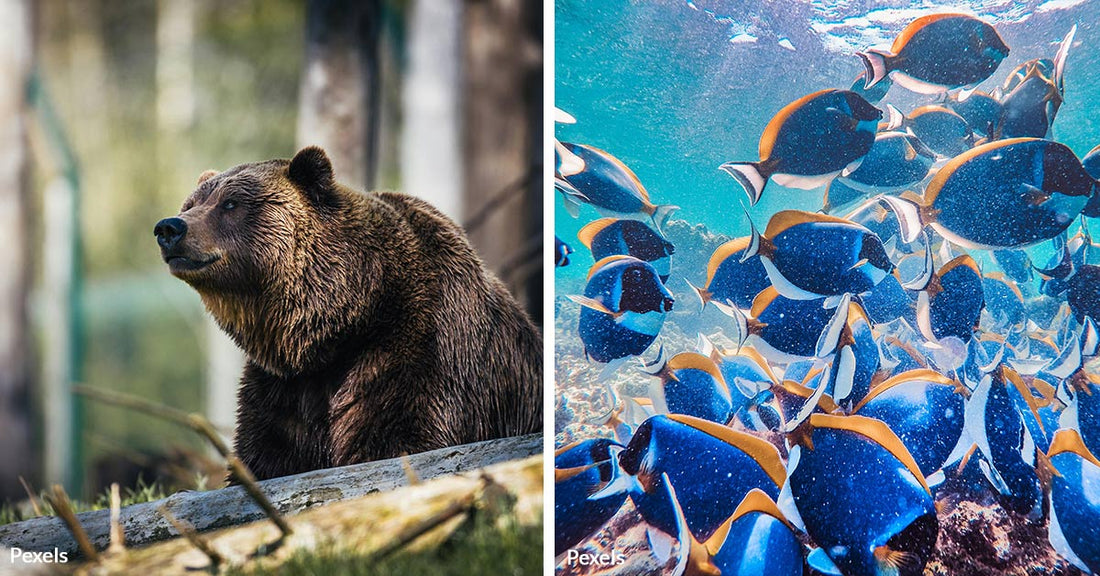URGENT: Bushfires Ravage People & Wildlife In Australia! Help Now!
How Rising Temperatures Reshape Animal Cognition and Ecosystem Dynamics
Matthew Russell
Climate change, a global crisis, is reshaping our world in profound ways, and its impact on animal behavior and brain function is becoming increasingly evident.
Recent scientific research has revealed some insight on how rising temperatures and diminishing habitats alter animal cognition and behavior. This silent threat may be causing more damage to our natural world than we previously thought possible.
 Photo: Pexels
Photo: PexelsOcean acidification affects the cognitive abilities of reef fish and sharks.
Altered Environments and Animal Responses
Human-driven climate change is transforming the Earth's ecosystems, presenting animals with unprecedented environmental challenges. Rising temperatures, shifts in rainfall patterns, and ocean acidification are altering habitats at a rapid pace.
These changes are impacting animal nervous systems, which are crucial for survival and reproduction, The Conversation reports. Animals rely on their senses - sight, taste, smell, and touch - to interact with their environment, and climate change is challenging these sensory experiences.
 Photo: Pexels
Photo: PexelsClimate change induces behavioral changes in animals, including altered migration and hibernation patterns.
Climate-induced alterations in ecosystem energy balances are disrupting animals' sensory worlds. For example, receptor proteins in mammals, which help discern temperatures, play a key role in habitat selection. These proteins are being tested by the new extremes, Scientific American reports. As well, environmental cues that animals depend on, like seasonal changes in daylight, are losing reliability, impacting behaviors like hibernation and migration.
Temperature shifts are particularly impactful. Studies show they are changing disease transmission patterns, as seen in mosquitoes, which are now increasingly taking humans as hosts due to altered temperature gradients.
 Photo: Pexels
Photo: PexelsClimate-driven shifts are leading some snakes into forested areas, increasing their predation on nesting birds to potentially unsustainable levels.
Cognitive Impairments and Heat Stress
With the rise in global temperatures, animal cognition is under threat. Learning, memory, and decision-making capabilities in animals are vital for survival and reproductive success. Studies show that heat stress can impair these cognitive functions. For example, zebra finches struggle to distinguish calls at high temperatures, and heat stress during egg incubation can lead to cognitive deficits in offspring, affecting their survival chances.
 Photo: Pexels
Photo: PexelsBehavioral shifts in animals due to climate change can restructure entire ecosystems.
Behavioral Adaptations to Climate Change
Animals are adapting their behaviors in response to climate adversity. Shifts in location, changes in daily or seasonal activity patterns, and alterations in geographic ranges are some examples. At least one scientific study points out how adaptations, while necessary, lead to new interactions with different species, predators, and pathogens, restructuring ecosystems in unpredictable ways.
Fish, for instance, moving to cooler, deeper waters, encounter light conditions their visual systems are not adapted to, indicating the profound effects of such behavioral shifts, reports The Conversation.
Animal brains are remarkably adaptable, and their nervous systems evolve to match the sensory environments of their habitats. However, climate change is challenging this adaptability. Studies show that while some parts of the nervous system are genetically adapted and less flexible, other parts show more plasticity. This dynamic suggests that climate change might eventually force nervous systems to evolve, selecting for new sensory and cognitive abilities.
 Photo: Pexels
Photo: PexelsZebra finches experience decreased ability to distinguish calls at high temperatures.
Future Directions and Conservation Efforts
The silent crisis of climate change is not just a threat to our environment but also to the cognitive and behavioral fabric of wildlife. The ability of animals to adapt, survive, and thrive in the face of rapidly changing climates hinges on our understanding and response to these challenges.
Understanding how animal cognition adapts to rapid environmental changes is crucial for predicting species' responses to climate change. Further technological advances and field studies will enhance our ability to make effective wildlife management decisions and potentially identify habitat refuges and conservation strategies.

